CD Projekt Red is a video game developer, publisher, and distributor from Poland, well known for its Witcher franchise. Their recent Cyberpunk 2077 release was horrendous, leading to a >60% price cut on their stock price and moving back to 2.5 years low.
This price dump can be an opportunity to get into a fundamentally good company in the video games space. Almost every other company in this space gained ~50% in the last year alone (EA, Activision-Blizzard, Take-Two, and more), making "value" opportunities in this space scarce at the moment.
To examine CD Projekt Red as an opportunity, we'll explore:
- What is their business, how they specifically operate
- The Cyberpunk 2077 bad game event
- What it means financially
- What it means for the brand
- How other bad game launches in the past fared
- How the company stands financially
- How good is the management, and what are their incentives
- Does the current price represent a value opportunity?
I already have a position after doing my research. I recommend reading it all and forming your own opinion.
Buying some CD Projekt Red $OTGLF $OTGLY ( $CDR in the Polish market).
— Snir David (long term investing) (@snird) April 13, 2021
My full analysis is coming up, but my current sentiment is positive in a 5-10 years outlook.
Business overview
All production steps in-house
CD Projekt is a Polish video game developer, publisher, and distributor. Their studio develops games using their in-house RED engine, then publishing and marketing it, and finally directly selling it to consumers through their GOG store on PCs (although distributed through other stores too).
This setup is somewhat unique in the video games industry, and it's worth noting that. Most of the time, the developer and publisher are separated entities. Let's examine how it's different through the lens of a big gaming franchise: Call of Duty.
Several independent studios are developing CoD games - Infinity ward, Treyarch, Sledgehammer games. So there is no one studio "owning" the development and direction of the franchise.
Then there are the publishers - in the CoD case, Activision. The publisher is responsible for marketing, sales, and communication with the community. The publisher often dictates things to the developing studios, driven by marketing and monetization.
Lastly, there is distribution. Consumers can buy CoD on third-party stores only - Steam, PS store, etc. (They do have Battle.net, but this is under the Blizzard publisher brand, not Activision).
A good model to compare this to is book production. The author (developer) is sponsored by a publisher (that is responsible for the direction, marketing, etc.) and the distributor (Book stores).
There are many different setups in the video-games world. There are publishers with first-party development studios that also publish other studios' games; there are distributors that fund developers who sell on other distributors (Microsoft) and on and on. Here are a few examples to demonstrate it:
CD Projekt being a first-party developer for their publishing scheme while having a store direct-to-consumers gives them some advantages.
When the developer and publisher are separate entities, it often leads to discontent due to (way too often) unrealistic demands from the developer, the final say on the creative process, and financial battles. As I wrote in my Activision-Blizzard analysis, lead developers of CoD left to start another studio, working for EA this time and publishing Apex Legend.
The same thing goes for the distribution channel. Having control over the distribution channel usually means more control over the user experience leading to better integration with the games. GOG for CD Projekt is one example, but Battle.net for Blizzard is a stellar example of what can be done with it.
The two divisions of CD Projekt
CD Projekt is divided logically into two divisions:
- Game production (develop & publish)
- Games distribution (GOG store)
The two operations have vastly different profit margins and costs, making separating them when looking at growth and other financial aspects essential.
As the split in the top line is ~65% for the games production segment and ~35% for the GOG distribution segment, the bottom line is slightly different.
GOG's contribution to the bottom line is almost nothing. GOG has the mission of distributing games DRM-free, making its catalog somewhat lacking in big games.
GOG's contribution to CD Projekt game production's bottom line is that most of their games sold through GOG, removing the middleman and saving 30-40% of the costs in distribution.
Producing AAA games
CD Projekt's primary business is the production of AAA games. Games that are top-tier globally, usually taking years to develop, teams of hundreds, and millions in costs.
Up until very recently, the only franchise CD Projekt had was "The Witcher". This franchise is super successful, especially since "The Witcher 3" had a fantastic critical response from both reviewers and gamers, which resulted in excellent financial results.
In December 2020, CD Projekt released "Cyberpunk 2077" to what can only be considered one of the worst releases ever of a AAA game. But we'll get to that later. Oh boy, we'll get to that.
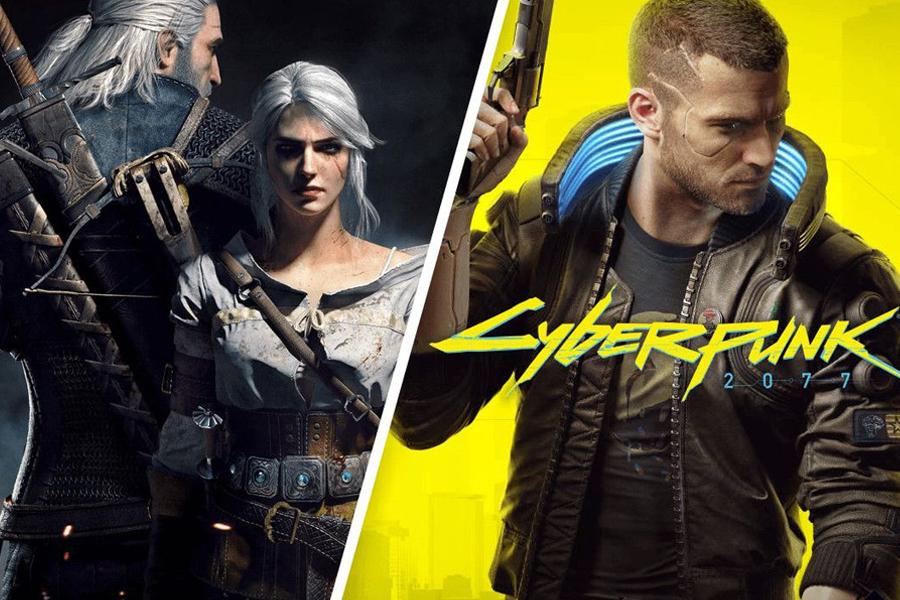
Every game production takes 4-5 years from "real" start to finish. Though "Cyberpunk 2077" was announced in 2012, substantial development resources haven't worked on it until 2015, after "The Witcher 3" was done.
And this is the development method of CD Projekt for decades now - almost all the studio focus is on one game alone for the extended period that it takes to develop it - usually 4-5 years.
This practice is risky - if a game is unsuccessful (as some think Cyberpunk 2077 will be), it means another 5 years until the next round, or effectively 10 years without a good producing asset for the company.
CD Projekt acknowledges this risk, and in their most recent strategy talk, they announced a change to that. More on this strategy talk in the next segment of this article - as these strategy changes are far-reaching.
The RED game engine
One thing a game developer company holds and improves over time is its game engine. In the CD Projekt case, it's the RED game engine.
Developed initially for "Witcher 2", they continued its development and usage in "Witcher 3" and now "Cyberpunk 2077".
The reason it's worth mentioning is that a private game engine can enable technological advancements not widely available to other competitors, making the company games unique.
If a new company will start today, trying to recreate "Witcher 3" or "Cyberpunk 2077" - even though they would not start from 0 with tools like Unity or Unreal engine, they will be far behind. They will have to pay royalties to the game engine providers and develop all the unique logic from scratch.
Overworking the employees - crunch mode
This is a weird subtitle to have under "Business overview", yet "crunch mode" is so fundamental to CD Projekt that it must be included in any reliable description of the business.
Crunch mode isn't unique to CD Projekt in any way - overworking the employees for 12, 13, 14, sometimes even 16 hours a day, sometimes 6 days a week, is sadly common in the video games industry.
I collected some recent articles on the subject if you want to dive deep into it:
- Grueling, 100-hour workweeks and 'crunch culture' are pushing the video game industry to a breaking point. Here's what's going on.
- Video game crunch: What is it and is it a problem?
- Despite Resistance, Crunch Continues to Define the Video Game Industry
Yet, the crunch mode in CD Projekt is even worse than the industry at large. After much fanfare around the crunch revolving around The Witcher 3, which the management themselves admitted was not humane - they promised to change.
Their promises did nothing, as similar crunch mode then instated for Cyberpunk 2077, forcing employees to work 6 days a week, for very long hours every day.
The crunch issue goes back decades, and it hurts the business in the long term. In 2010, developers from CD Projekt left to start another studio - 11bit studio. Even though they never directly said it was because of crunch, in a postmortem for the studio first game they mention in the 2nd point their high intentions to avoid crunch. Today the studio is a very successful one - marking lost talent and higher competition in Poland for CD Projekt.
Cyberpunk 2077 failure
In December 2020, CD Projekt released their long-awaited (and 3 times delayed) Cyberpunk 2077 game.
The game was in such a bad state that some call it the worst AAA game launch ever. And we live in a world where Fallout 76 exists.
The launch was so bad that the stock lost ~60% from its top at 420PLN in 4 months. So steep in fact that it prompted me to look into it - maybe there's an opportunity here.
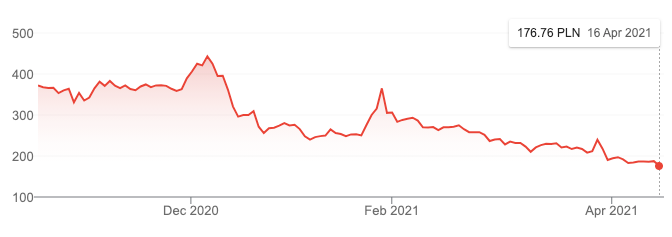
How bad is it
After playing the game myself for 20 hours, watching multiple streamers and gamers play and respond, and watching curated content about the issues - I can confidently say that it is very bad.
The game is broken. While in PC it's at least playable (for certain bursts of time), in consoles (PlayStation and Xbox), it's so buggy to the point that the gamers can't play the game at all, leading sony to pull the game of its PlayStation shop - the first time such a thing happened.
To understand the gravity of the issue, I collected some videos demonstrating how bad things are:
- 10 Minutes Of Cyberpunk 2077 Bugs - 1.5M views at the moment. Uploaded 3 days after the launch.
- Cyberpunk 2077: Dumb Yet Hilarious Glitches - Another collection of bugs, somewhat more ordered.
- RDR2 obliterates Cyberpunk 2077 - Comparing Red Dead Redemption 2 from Rockstar to Cyberpunk 2077 in various actions. It shows how far behind the engine of Cyberpunk is.
The game seems to be 8-12 months away from being ready.
Given that 5 months have passed, and a week ago they released the second patch, that even though already fixed a lot, haven't yet fixed enough - makes this estimation of 8-12 months reasonable.
Why did they do it?
- A public company wanting to please investors after 3 delays in the launch.
- Peak video games sales for the holiday season (that's why December launch).
- The assumption is that gamers are forgiving for "launch" issues.
- Hubris from the "Witcher 3" phenomenal success.
They misjudged how broken the game is and how unforgiving the community will be for this level of unreadiness from their game. (Hopefully, if they knew this kind of backlash is coming, they will lose the class action against them).
The reasons they did it and the issues behind those reasons are nothing new in the AAA video games industry. Publishers often push for holiday season release, and they often release buggy games with "day one patch" and reliance on the internet to deliver more fixes later.
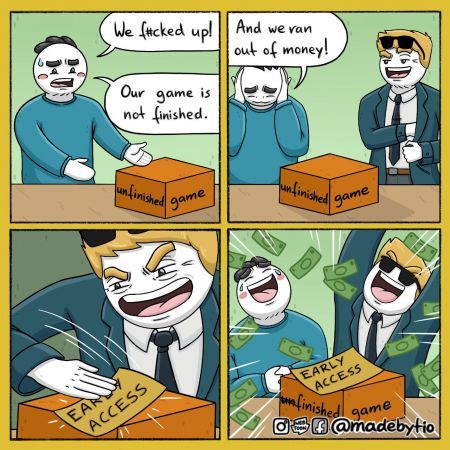
If anything - I think this incident will teach CD Projekt a vital lesson, such that they will over-correct and in a few years will be the heroes of the gaming community again.
Bad game launches made better have happened before. No Man's Sky is the most famous example. Let's examine bad game launches to learn from history.
Learning from other bad game launches
No Man's Sky
No Man's Sky represents what could be the closest example to the fate of Cyberpunk 2077, even though it's an indie game developed by less than 15 people at the time compared with ~700 people working on Cyberpunk 2077 (1,100 employees, 700 of them are developers (page 21)).
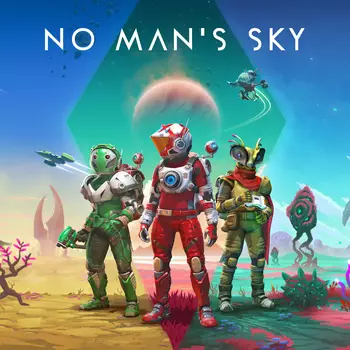
It was overpromised and overhyped for years, just like Cyberpunk 2077. When the game launched, all those broken promises were revealed.
It missed so many promises that users on Reddit crafted lists of the missing features. The lists were long - it seemed as though the game that launched was an empty shell, only bragging on the "procedural generation" tech it brought, that nobody cared for.
Add insult to an injury, the game sold for 60$, a price tag for AAA games. For comparison, Cyberpunk 2077 had so much more work done on it also sells for 60$.
But what the developers decided to do next is the turn of the story. Instead of abandoning the project, they worked on it relentlessly for years, improving and adding all the missing promised features and then some.
"Internet Historian" created a 1 hour documentary about No Man's Sky, which I highly recommend watching if you want to get into the details of this. He also created a spreadsheet showing what features were promised and not delivered at launch and what is available now.
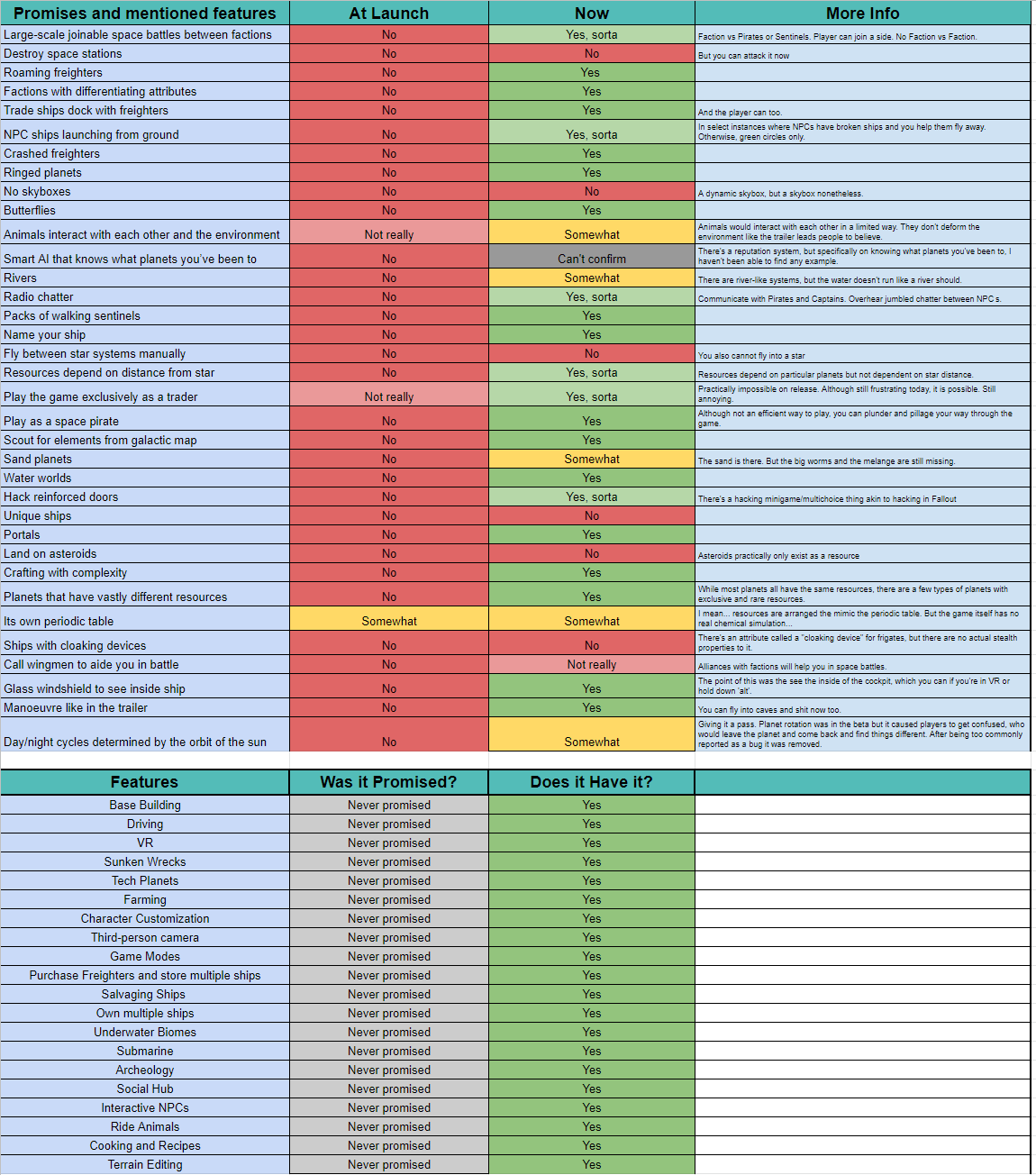
Through the years and updates, the game has improved so much that its reviews are now overwhelmingly positive, and it won multiple best game awards.
What it means for Cyberpunk 2077
While Cyberpunk 2077 was overhyped, its problems are less severe than No Man's Sky to some extent - mainly focusing on the engine readiness and the game bugs.
CD Projekt is working hard to fix those issues, with two big patches already out and more to come. It seems that their commitment to the franchise is stable, and the game will be fixed.
The potential for Cyberpunk 2077 to become a big attractive franchise like The Witcher is there, and I believe in CD Projekt's ability through time to fix the game and make this franchise on par with The Witcher. However, this might take a few years.
CD Projekt's willingness to take the blame and fix the game will eventually turn things around. The only question is how long it would take, the financial impact, and whether their current price reflects that - and I'll get to it in the "Valuation" section.
Other failed game launches
Many other failed game launches to learn from, and I took the time to know in detail another 20 high-stake game launches that failed. Note that a failed launch doesn't mean financial failure. A failed launch is one in which the audience was overwhelmingly unsatisfied with the product.
No Man's Sky is the example most relevant to Cyberpunk 2077 case, but let's go quickly over some over examples:
- Fallout 76 - Not only that the game was very buggy and missing many features, but the developer also didn't make any effort to fix it. If anything, they made it worst over time by pushing more micro-transactions into the game. We will never see how destructive this has been since Microsoft bought Zenimax media (the studio owner)
- Warcraft 3: reforged - Never fixed. Essentially destroyed a community existing for decades. Nevertheless - it didn't do anything to other products of Blizzard. Gamers seem to have a very short memory.
- Simcity 2013 - EA didn't care and never fixed it. Shortly after Cities:Skylines, a competitor city builder game, took the entire community.
Most failed launches never get fixed because it doesn't worth it. The developer made their buck selling on launch - they don't care about the long tails. Onward to the next game.
But CD Projekt does care about Cyberpunk 2077 beyond the initial sales. This is a franchise that should have multiple games and DLCs coming up.
CD Projekt signals that they are making this game better, similar to what No Man's Sky did. For a game with a good underlying story and theme, it might be worth it, if not for the current incarnation, then for the next one.
If EA had fixed Simcity, they could have taken the cities building games title from Cities:Skylines, which released a new paid expansion almost every year for years now—making the total income from the game much more significant over the years.
Not a financial failure, initially
Most of any game sales occur in its launch. Cyberpunk 2077 had a very successful launch. They had $563m in sales and only $2m in refunds.
These sales figures are the best ever for CD Projekt, but it could still be better. GTA 5 had $1b in sales within the first 3 days of launch, for perspective.
Big AAA games have an expected long-tail of sales, too - GTA 5 had 20m units sold, which is about $900m in sales in 2020, 7 years after its initial launch. I doubt Cyberpunk 2077 will have this kind of resaleability - unless they will fix the game. And that's the whole story - and why the stock didn't jump up right back when they announced the impressive sales numbers for Cyberpunk 2077.
Changing how the business work - Strategy 2021
The failure of Cyberpunk 2077, followed by investors' concerns, class action lawsuits, and a very big impact on the stock price, lead the management team to decide on some significant changes to the company operations presented on March 30, 2021 strategy update.
Some of these changes, if implemented correctly, can have a significant impact on the company's results in the following years.
Developing multiple games at once
Moving from one game developed at a time to multiple (currently two - Cyberpunk & Witcher) is a big move away from what the company used to be doing for the past 20+ years.
This plan changes the organization structure, development, and the required staff to sustain such a model. CD Projekt announced plans to expand the development team to support this and instill a new CTO with a new role definition to execute on the structure plan.
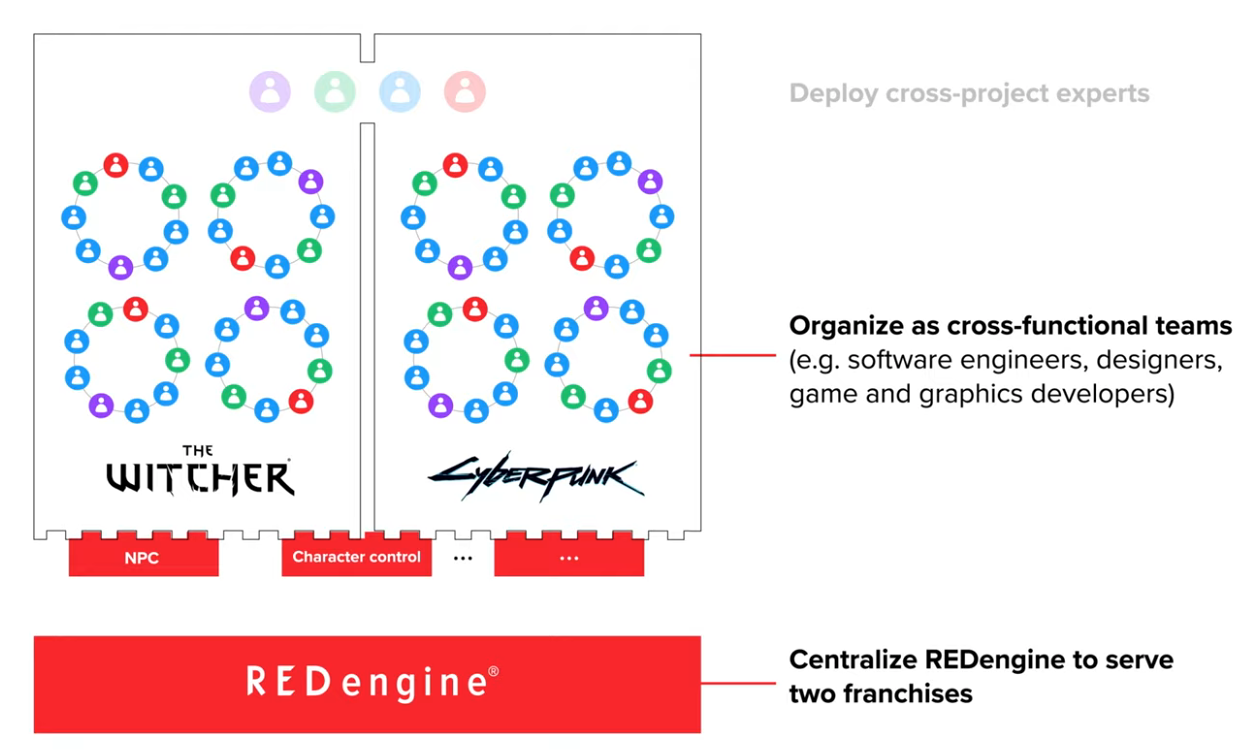
The plan seems feasible, though not without risk. Changing the company's entire way is always risky, even if the methodology is tried and tested.
But if CD Projekt can pull this off, it effectively means developing 2 AAA games with much fewer resources, as development resources will be reused across games.
The plan is to begin parallel development in 2022, which makes sense given the organizational changes needed and that 2021 is probably 100% devoted to fixing Cyberpunk 2077.
Don't over-hype games
The initial announcement of Cyberpunk 2077 dates way back to 2012, with a full-on campaign starting in 2015 after The Witcher 3 launch. That's 8 years (or 5) of building expectations and hype around a game.
When you start showing things this early, with every event and announcement that aims to keep the game in the collective memory, you must overdo your former self. Doing so for 8 years balloons expectations to an unsustainable level, resulting in a product that can never stand up to the hype no matter how good it really is.
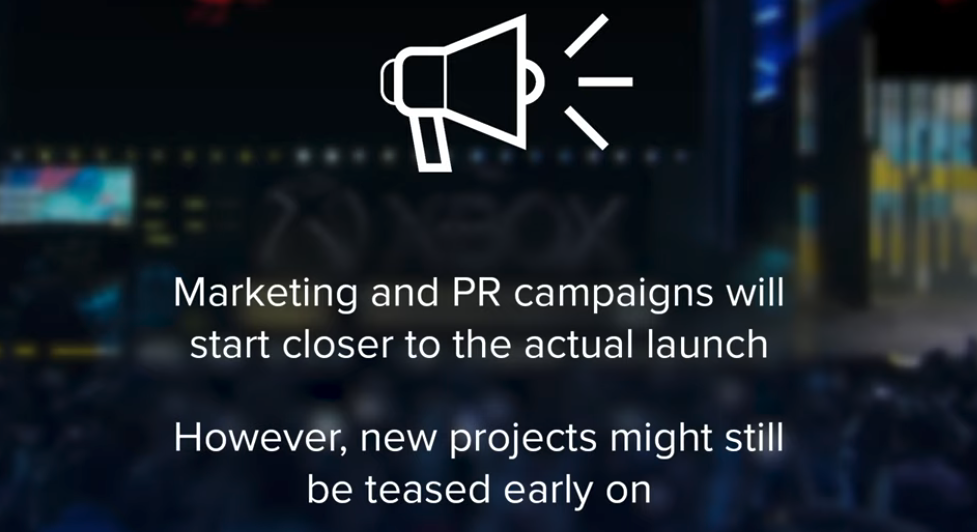
Revamping the approach toward marketing will result in games being better received by players, though it might hurt initial sales. But I'm all for it, preferring the long-term sustainability of the gamers community, and therefore sales, over short bursts of initial sales through unsustainably hyped games.
Stop overworking the employees
CD Projekt devoted an entire section of the presentation to make a more sustainable environment for their employees.
I call absolute bullsh*t and corporate lingo. You can almost smell the lies and the PR people writing the message.
CD Projekt will continue to be a horrible working place, and I wouldn't recommend even my worst enemies to take up a position in this company if they want any chance of work-life balance.
CD Projekt promised multiple times in the past this would change, and they did nothing. I can see no reason for it to be different this time.
If any executive in CD Projekt will ever read these words - you need to stop saying things like that to investors. At this point, you either do or shut up because this presents you as either incompetent or liars.
It doesn't mean that people won't work for CD Projekt - it just means that people that care for work-life balance won't work for CD Projekt. Many people want to get into the video games industry so badly that they don't mind giving up their life for it.
Financials
CD Projekt is a Polish company, making its financial data harder to come by on the regular data aggregator sites (I checked all of them, and all of them have incorrect data for some reason).
The excel of financial data provided by CD Projekt is divided in a way that makes it hard to see a trend. So I collected the data myself from each annual report, adjusted it into one table, ready for you to download. Note that all the numbers are in thousands of Zlotti, not USD.
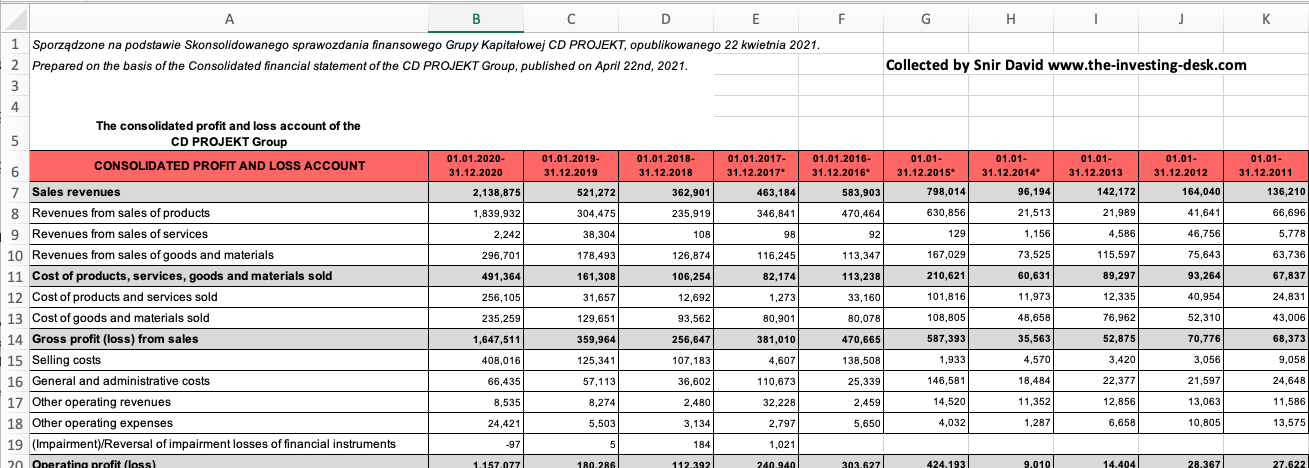
The company debt and liabilities are negligible, and they sit on so much cash post the Cyberpunk 2077 initial sales that there is no risk of bankruptcy.
CD Projekt now has 563 million Zlotti in cash. Having high amounts of cash after a game release is normal, but consider that in 2015 after the release of The Witcher 3, they had 353 million Zlotti - the current cash pile makes their situation looks much better.
With this amount of money, they have enough runway to develop either one new franchise (that costs more) and one new game in an existing franchise, or more reasonably, 3 AAA games on their existing franchises: The Witcher and Cyberpunk.
That is all to say that we shouldn't treat CD Projekt simply as a company with one super successful franchise and another that had a dreadful start.
Instead, they are a company with a super successful franchise and another with a bad start but with enough runway to make the lousy franchise shine while capitalizing on the already successful one.
Management
CD Projekt's management has issues that are apparent through the bad release of Cyberpunk 2077. From the bad judgment to being pressured by investors, and through arrogance following the amazing success of The Witcher 3 that might lead them to all of that.
But I believe they had the best intentions in mind - just as the team behind "No Man's Sky" had the best intentions, they just failed to deliver on that instance. And just as the team behind "No Man's Sky" proved they could fix it and come out stronger, it might be the same case for CD Projekt.
The founders of the company still run it (as co-CEOs), and its CFO is with the company since 1999, being the 10th employee. All of them have a majority stake in the company, too.
These guys care about the company and its legacy. They built it for over 25 years, struggling through hard times and several points of near-bankruptcy.
Their GOG project, leading the mission of the DRM-free games store, is proof of how much they care. Instead of setting up another store to make lucrative margins out of other publishers' game sales, they set up a mission driven by the community without much profit.
This commitment and care make me sure that the company will be fine in the long term and will go back in line to produce great products that the audience will love.
And that is all they have to do for the company to be an excellent investment - create good games. Others like EA and Activision-Blizzard are priced so high that they need to do more than great games. That's why they are forced into loot-boxes, microtransactions, and other anti-gamers schemes.
Valuation
CD Projekt is a challenging company to value by "traditional" measures due to its cyclicality and its small size - having one big game every few years and no consistent income in between.
The video games industry at large is very cyclical - with high sales on the holiday season and almost nothing (in comparison) in other times. This kind of cyclicality is addressable as it is consistent annually. Other big companies in the video games sector even launch their biggest franchise every year. Examples are Activision-Blizzard with Call of Duty or EA with their sports games (FIFA, etc.).
CD Projekt is a tiny studio in comparison, releasing one big game every five years, making its multiples very volatile, from 10~ in a year of a big release to ~200 in a year before a release, anticipating the release income.
The same problem occurs when we try to look at Free Cash Flows and apply a DCF model. The FCFs of the company are so volatile and so concentrated that any attempt to use a DCF model (and believe me, I tried) results in nonsense.
What I will attempt to do instead is value the company using other similar companies.
Similar competitors for the valuation
The two companies I will look at to compare are Take-Two ($TTWO) and Paradox Interactive ($PDX.ST).
The two companies are traded with a market cap of ~21B$ and are structurally similar(er) to CD Projekt (where Activision-Blizzard or EA, for example, are too far away structurally).
When I say structurally similar, I mean that they are companies with most of their profits attached to AAA games sales. Paradox more than Take-Two, but it's close enough.
Valuing the profits
At the time of writing, CD Projekt's market cap is ~4.5B$. Taking a margin of safety, if CD Projekt's profits are 1/4 of those companies, this might be a fair value.
Specifically, I will evaluate gross profits. That way, I will address the GOG subsidiary of CD Projekt that inflates revenues without much margin and address different sections in Take-Two and Paradox without making the re-investments in the business affect the result too much.
For me, these numbers check out, making the current trading price of CD Projekt fairly valued with a margin of safety.
In launch years (2015, 2020), we have profits relatively bigger than Take-Two and Paradox, and in the years between releases having it close enough in 2016, 2017 and eroding sales in 2018, 2019.
But the "in-between" years should get less of an effect now that CD Projekt has one more franchise and plans on developing both franchises at the same time.
Take-Two and Paradox, in comparison, have not launched any new franchise recently, so in a way, I'm judging CD Projekt in harsher terms, and they still did quite well and should do much better moving forward.
Valuing the future
The comparison above serves as a "sanity check" for the current base price of the company. After the recent drop of >60%, we are back on the company's price in 2019, removing all the "frenzy" of anticipating Cyberpunk 2077 to "break the world of gaming".
Yet, there is something to be said about Cyberpunk 2077, even if it will not have the long-tail sales of GTA 5 that Take-Two still enjoys many years later.
It is still a new franchise launch, a good franchise, even if the first iteration is suboptimal.
The RED engine development in the directions of first-person shooter and open-world are long-term assets worth a lot for the following games of CD Projekt.
As it is - it's like CD Projekt is playing on hard mode while everyone else is playing on easy mode. They perfected a third-person, restricted, fantasy world engine in 3 iterations of The Witcher to spawn a new franchise that is a first-person, open-world, futuristic-realistic game.
Yes, their engine is far from ready and being on par with Take-Two's Rockstar engine for GTA. Suppose it was on-par, the valuation of 11B$ before the drop wouldn't be far-fetched. It might even be a bargain.
But it's not too far either. And it is the only thing holding the company back in terms of their products. Their production value, acting (did you see those Keanu Reeves parts?), music, story-telling, etc., are all top-notch.
The promise for which the company traded at 11B$ is achievable within a reasonable time frame, 3-5 years, in my opinion. If this will happen, I look at a potential 100% return within a few years. If not, the video games market as a whole is growing, so a good return is all but guaranteed with a minimal downside due to the de-risking of the recent 60% drop and the fact that the company is not leveraged and has its biggest pile of cash ever.
